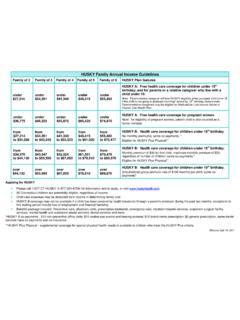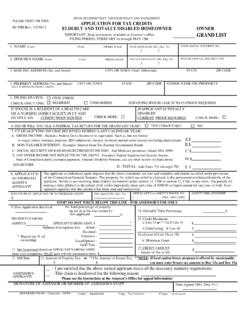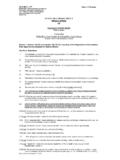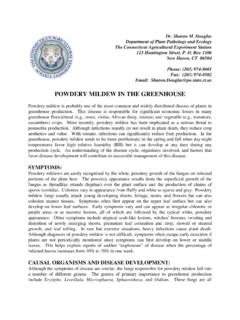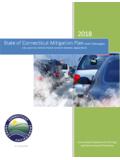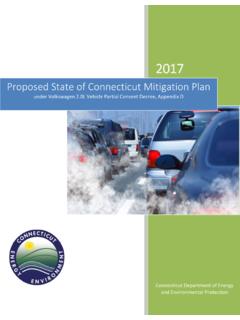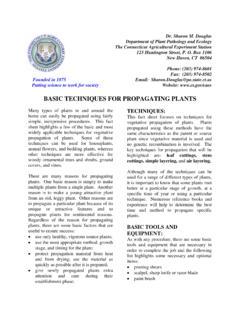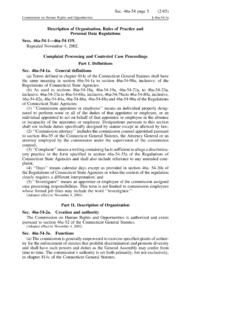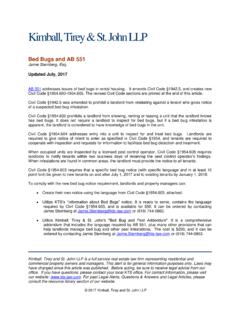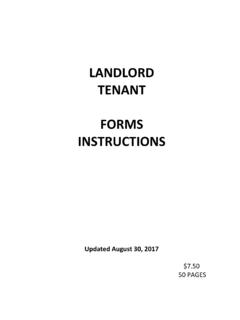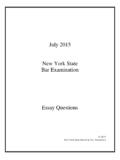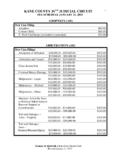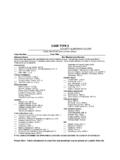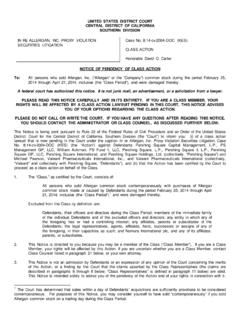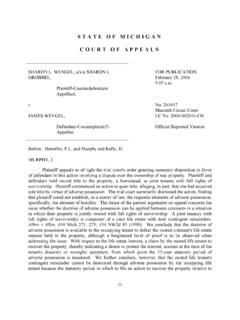Transcription of Sec. 4-61dd. Whistle-blowing. Disclosure of information to ...
1 Sec. 4-61dd. Whistle-blowing. Disclosure of information to Auditors of Public Accounts. Investigation by Attorney General. Rejection of complaint. complaints re retaliatory personnel actions. Report to General Assembly. Large state contractors. Posting of notice. Definitions. (a) Any person having knowledge of any matter involving corruption, unethical practices, violation of state laws or regulations, mismanagement, gross waste of funds, abuse of authority or danger to the public safety occurring in any state department or agency or any quasi- public agency, as defined in section 1-120, or any person having knowledge of any matter involving corruption, violation of state or federal laws or regulations, gross waste of funds, abuse of authority or danger to the public safety occurring in any large state contract, may transmit all facts and information in such person's possession concerning such matter to the Auditors of Public Accounts.
2 The Auditors of Public Accounts shall review such matter and report their findings and any recommendations to the Attorney General. Upon receiving such a report, the Attorney General shall make such investigation as the Attorney General deems proper regarding such report and any other information that may be reasonably derived from such report. Prior to conducting an investigation of any information that may be reasonably derived from such report, the Attorney General shall consult with the Auditors of Public Accounts concerning the relationship of such additional information to the report that has been issued pursuant to this subsection. Any such subsequent investigation deemed appropriate by the Attorney General shall only be conducted with the concurrence and assistance of the Auditors of Public Accounts. At the request of the Attorney General or on their own initiative, the auditors shall assist in the investigation.
3 (b) (1) The Auditors of Public Accounts may reject any complaint received pursuant to subsection (a) of this section if the Auditors of Public Accounts determine one or more of the following: (A) There are other available remedies that the complainant can reasonably be expected to pursue;. (B) The complaint is better suited for investigation or enforcement by another state agency;. (C) The complaint is trivial, frivolous, vexatious or not made in good faith;. (D) Other complaints have greater priority in terms of serving the public good;. (E) The complaint is not timely or is too long delayed to justify further investigation; or (F) The complaint could be handled more appropriately as part of an ongoing or scheduled regular audit. (2) If the Auditors of Public Accounts reject a complaint pursuant to subdivision (1) of this subsection, the Auditors of Public Accounts shall provide a report to the Attorney General setting out the basis for the rejection.
4 (3) If at any time the Auditors of Public Accounts determine that a complaint is more appropriately investigated by another state agency, the Auditors of Public Accounts shall refer the complaint to such agency. The investigating agency shall provide a status report regarding the referred complaint to the Auditors of Public Accounts upon request. (c) The Attorney General may summon witnesses, require the production of any necessary books, papers or other documents and administer oaths to witnesses, where necessary, for the purpose of an investigation pursuant to this section or for the purpose of investigating a suspected violation of subsection (a) of section 17b- 301b until such time as the Attorney General files a civil action pursuant to section 17b-301c. Upon the conclusion of the investigation, the Attorney General shall where necessary, report any findings to the Governor, or in matters involving criminal activity, to the Chief State's Attorney.
5 In addition to the exempt records provision of section 1-210, the Auditors of Public Accounts and the Attorney General shall not, after receipt of any information from a person under the provisions of this section or sections 17b-301c to 17b-301g, inclusive, disclose the identity of such person without such person's consent unless the Auditors of Public Accounts or the Attorney General determines that such Disclosure is unavoidable, and may withhold records of such investigation, during the pendency of the investigation. (d) (1) No state officer or employee, as defined in section 4-141, no quasi-public agency officer or employee, no officer or employee of a large state contractor and no appointing authority shall take or threaten to take any personnel action against any state or quasi-public agency employee or any employee of a large state contractor in retaliation for (A) such employee's or contractor's Disclosure of information to (i) an employee of the Auditors of Public Accounts or the Attorney General under the provisions of subsection (a) of this section; (ii) an employee of the state agency or quasi-public agency where such state officer or employee is employed; (iii) an employee of a state agency pursuant to a mandated reporter statute or pursuant to subsection (b) of section 17a-28.
6 Or (iv) in the case of a large state contractor, an employee of the contracting state agency concerning information involving the large state contract; or (B) such employee's testimony or assistance in any proceeding under this section. (2) (A) Not later than ninety days after learning of the specific incident giving rise to a claim that a personnel action has been threatened or has occurred in violation of subdivision (1) of this subsection, a state or quasi-public agency employee, an employee of a large state contractor or the employee's attorney may file a complaint against the state agency, quasi-public agency, large state contractor or appointing authority concerning such personnel action with the Chief Human Rights Referee designated under section 46a-57. Such complaint may be amended if an additional incident giving rise to a claim under this subdivision occurs subsequent to the filing of the original complaint. The Chief Human Rights Referee shall assign the complaint to a human rights referee appointed under section 46a-57, who shall conduct a hearing and issue a decision concerning whether the officer or employee taking or threatening to take the personnel action violated any provision of this section.
7 The human rights referee may order a state agency or quasi-public agency to produce (i). an employee of such agency or quasi-public agency to testify as a witness in any proceeding under this subdivision, or (ii) books, papers or other documents relevant to the complaint, without issuing a subpoena. If such agency or quasi-public agency fails to produce such witness, books, papers or documents, not later than thirty days after such order, the human rights referee may consider such failure as supporting evidence for the complainant. If, after the hearing, the human rights referee finds a violation, the referee may award the aggrieved employee reinstatement to the employee's former position, back pay and reestablishment of any employee benefits for which the employee would otherwise have been eligible if such violation had not occurred, reasonable attorneys' fees, and any other damages. For the purposes of this subsection, such human rights referee shall act as an independent hearing officer.
8 The decision of a human rights referee under this subsection may be appealed by any person who was a party at such hearing, in accordance with the provisions of section 4-183. (B) The Chief Human Rights Referee shall adopt regulations, in accordance with the provisions of chapter 54, establishing the procedure for filing complaints and noticing and conducting hearings under subparagraph (A) of this subdivision. (3) As an alternative to the provisions of subdivision (2) of this subsection: (A) A. state or quasi-public agency employee who alleges that a personnel action has been threatened or taken may file an appeal not later than ninety days after learning of the specific incident giving rise to such claim with the Employees' Review Board under section 5-202, or, in the case of a state or quasi-public agency employee covered by a collective bargaining contract, in accordance with the procedure provided by such contract; or (B) an employee of a large state contractor alleging that such action has been threatened or taken may, after exhausting all available administrative remedies, bring a civil action in accordance with the provisions of subsection (c) of section 31- 51m.
9 (4) In any proceeding under subdivision (2) or (3) of this subsection concerning a personnel action taken or threatened against any state or quasi-public agency employee or any employee of a large state contractor, which personnel action occurs not later than two years after the employee first transmits facts and information concerning a matter under subsection (a) of this section or discloses information under subdivision (1) of this subsection to the Auditors of Public Accounts, the Attorney General or an employee of a state agency or quasi-public agency, as applicable, there shall be a rebuttable presumption that the personnel action is in retaliation for the action taken by the employee under subsection (a) of this section or subdivision (1) of this subsection. (5) If a state officer or employee, as defined in section 4-141, a quasi-public agency officer or employee, an officer or employee of a large state contractor or an appointing authority takes or threatens to take any action to impede, fail to renew or cancel a contract between a state agency and a large state contractor, or between a large state contractor and its subcontractor, in retaliation for the Disclosure of information pursuant to subsection (a) of this section or subdivision (1) of this subsection to any agency listed in subdivision (1) of this subsection, such affected agency, contractor or subcontractor may, not later than ninety days after learning of such action, threat or failure to renew, bring a civil action in the superior court for the judicial district of Hartford to recover damages, attorney's fees and costs.
10 (e) Any employee of a state or quasi-public agency or large state contractor, who is found by the Auditors of Public Accounts, the Attorney General, a human rights referee or the Employees' Review Board to have knowingly and maliciously made false charges under subsection (a) of this section, shall be subject to disciplinary action by such employee's appointing authority up to and including dismissal. In the case of a state or quasi-public agency employee, such action shall be subject to appeal to the Employees' Review Board in accordance with section 5-202, or in the case of state or quasi-public agency employees included in collective bargaining contracts, the procedure provided by such contracts. (f) On or before September first, annually, the Auditors of Public Accounts shall submit, in accordance with the provisions of section 11-4a, to the clerk of each house of the General Assembly a report indicating the number of matters for which facts and information were transmitted to the auditors pursuant to this section during the preceding state fiscal year and the disposition of each such matter.
